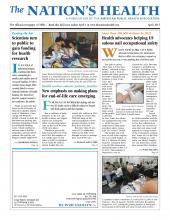Less than half of adults with mental illness receive advice from a doctor to eat better or exercise more, according to a recent study.
The findings come from research published online Jan. 14 in The Diabetes Educator.
Previous research shows adults with serious psychological distress are at a higher risk for chronic diseases, such as diabetes, even if they have not been diagnosed yet, said Xiaoling Xiang, MPhil, MSW, a study author and researcher at the University of Illinois at Urbana-Champaign.
“By not dispensing health advice to adults with serious psychological distress alone, we are missing tremendous opportunities to prevent future diseases, reduce disabilities and decrease medical costs,” Xiang told The Nation’s Health.
Researchers looked at more than 5,900 people who screened positively for serious psychological distress from the household component of the Medical Expenditure Panel Survey from 2007 to 2011. Survey participants were asked whether a health professional recommended more exercise and to eat healthier. They were also assessed for diabetes risk factors, such as hypertension and high cholesterol.
About 49 percent of adults with serious psychological distress received exercise advice from a health professional and almost 46 percent of those adults were told to cut back on fatty foods. Additionally, more than 73 percent of adults with serious psychological distress who already had diabetes said a doctor did recommend they eat less fat and work out more often.
“Many patients with serious mental illness are chronic users of antipsychotics, which can cause dramatic weight gain, dyslipidemia and metabolic abnormalities,” Xiang said. “This puts them at heightened risk for certain chronic diseases. Also, a sometimes overlooked factor is that adults with serious psychological distress and other mental illnesses disproportionately live in poverty, which restricts their access to healthy food and opportunities to participate in physical activity.”
It is important that primary health care providers do mental health screenings because they could help target people in need of counseling with tools on how to change their lifestyles, Xiang said.
“Mental health professionals are also well-positioned to provide brief nutrition and exercise counseling, as they have frequent contact with the targeted population,” Xiang said. “In addition, it may be useful for different providers — including primary care providers, mental health professionals, dietitians and exercise specialists — to establish a formal referral system in order to connect patients to specialty care as needed and reinforce the message of engaging in healthy lifestyles.”
For more information, visit http://tde.sagepub.com/content/early/2015/01/13/0145721714567234.abstract.
- Copyright The Nation’s Health, American Public Health Association









